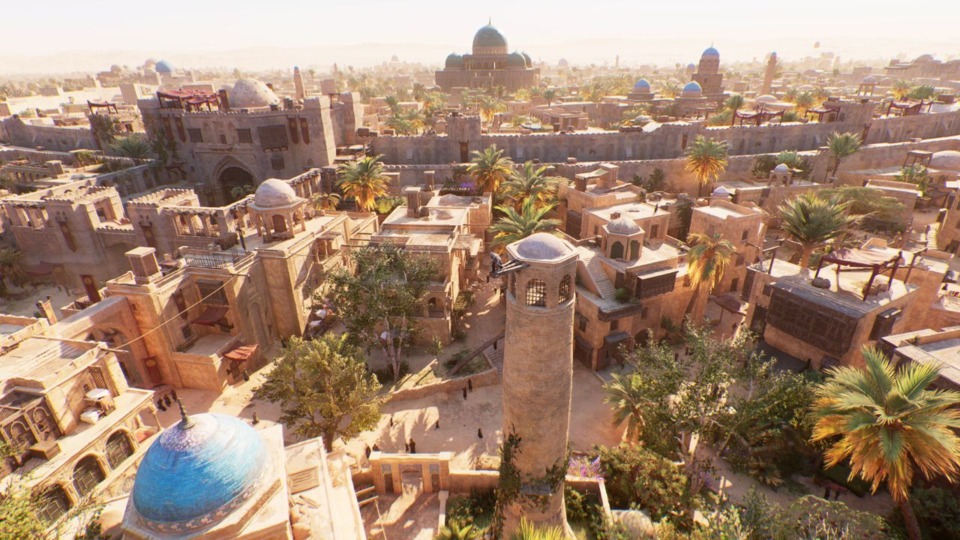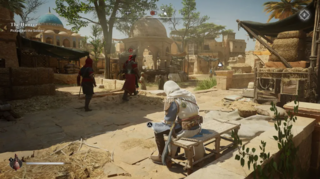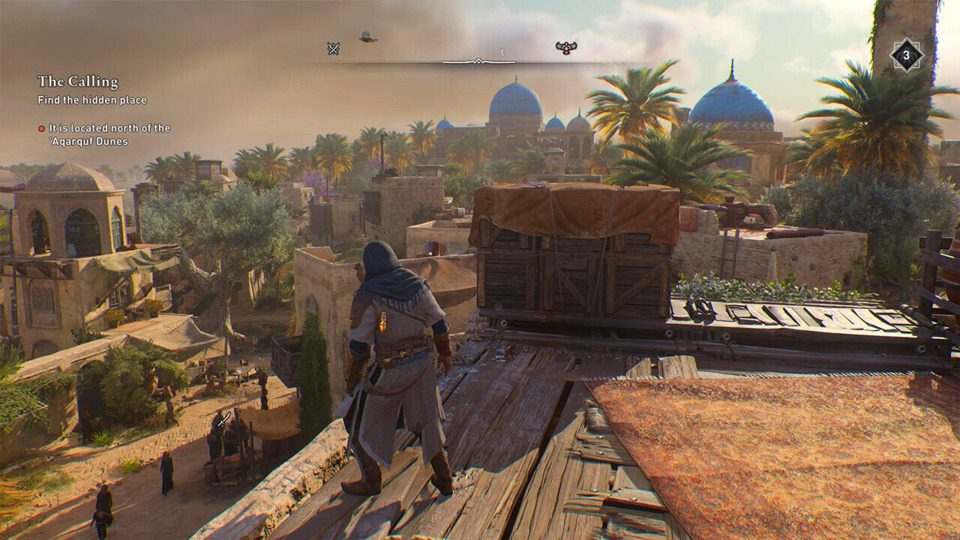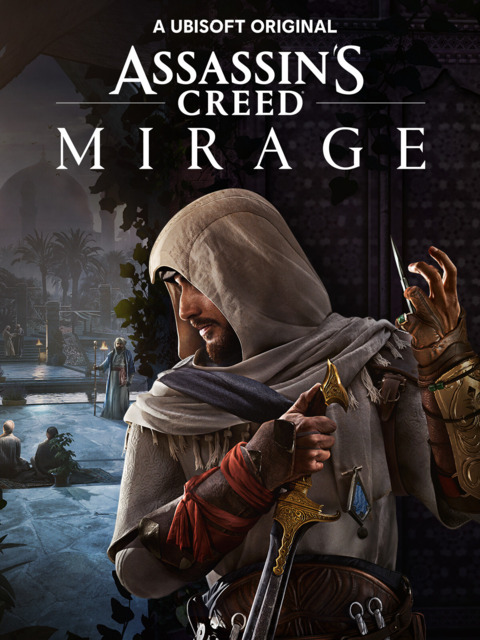Assassin's Creed Mirage is a mostly solid return to form

In hindsight it maybe seems inevitable that Assassin’s Creed would move back to its roots after it reinvented itself in 2017 with the excellent Assassin’s Creed Origins, a game that restructured the series around gigantic open-worlds and 100 hour playtimes. Origins and the two games that followed were exhaustively huge, and while I dearly loved Origins and Odyssey, I could feel myself craving a return to form after burning out on the most recent entry, Valhalla. Assassin’s Creed Mirage, then, is right up my alley. It’s a game aimed squarely at the truest components of the franchise—a dense urban environment, wristblade assassinations, towers, hay bales, and combat that wavers between stylishly satisfying and cumbersome. Mirage has all of these things, and while it may be a bit mellower of an experience than the grand sweeping adventures of the last few games, it manages to capture the basic flavors of Assassin’s Creed in a way that is equally compelling and flawed.
A prequel of sorts to Valhalla, Mirage is set in 9th century Baghdad where protagonist Basim, who played a large role in the previous game, has joined the local band of assassins—here called Hidden Ones—to investigate and dismantle the Order of the Ancients—Templar precursors. Aside from dealing with some of Basim’s personal troubles regarding his identity and a nightmarish creature that is haunting his dreams, the story does not expand too far beyond those boundaries. It primarily plays out through an investigative structure, where each mission unveils new clues and leads to follow that eventually reveal a new target to assassinate. The narrative isn’t exactly replete with memorable characters or story beats, and the villains tend to be introduced and then quickly dispatched before the breadth of their impact on Baghdad is really felt. I found working through the branches of the investigation tree to be pretty satisfying, but the game would’ve benefited from stronger characterization and writing.

It helps that the city of Baghdad is stunning, easily one of my favorite locations in an Assassin’s Creed game. It’s an incredibly dense and beautifully detailed setting, with distinct districts, crowds of NPCs moving about, and a day/night cycle that looks gorgeous no matter the time of day. The game’s visual splendor extends to the surrounding wilderness as well, though you don’t spend too much time out there over the course of the game.
The layout of the city is also well-crafted for the parkour system, always a highlight of any Assassin’s Creed game. Many of the tricks introduced in previous titles are in play here: swinging around corners on hooks, rocketing up to a rooftop by grabbing a rope and dropping a counterweight, pole vaulting, scurrying across branches. I very rarely felt like I needed to stop and look around for the ideal parkour path because the city is laid out in such a way that sprinting up and down buildings and bounding over rooftops comes naturally. Granted, this is an expectation for any Assassin’s Creed game at this point, but it still feels satisfying when it’s done this well. Plus, it just feels great to be navigating dense city streets again after the wide open expanses of the recent games.
There is fast travel between towers that you climb and synchronize with, but the game rewards on-foot travel in a few different ways. There are items to pickpocket from various NPCs that can be delivered to a friendly merchant for rewards, as well as mysterious shards being carried by hostile NPCs prowling around that can unlock gear from an underground vault. But the codex entries were my favorite “collectible.” There are loads of them to discover, typically positioned outside of landmarks and other points of interest, and they include detailed historical entries about the time period and setting and real-world photography of locations and artifacts. For a history fan like me, and one who has always enjoyed the historical side of Assassin’s Creed more than the modern day story, these were a treat to find and read throughout the game.
Combat in Mirage takes the form of stealthy takedowns and open sword fighting. It must be said that neither of these two areas of the game are particularly amazing. For one, the enemy AI has very limited vision, at least on Normal difficulty, and it’s not uncommon to eliminate a guard stealthily in full view of another and get away with it. A lot of this depends on Basim’s “state” when performing the stealth kill; grabbing an enemy from a patch of tall grass tends to be far more invisible, even in broad daylight, than doing the deed out in the open. There’s a mechanical difference here that’s somewhat clear, but it makes a lot of the guards in Baghdad seem pretty dumb as a result. At the same time, the art of wristblading through a base of soldiers without being seen remains pretty satisfying even if it isn’t always challenging.

Open combat is also a mixed experience. I had a great time with the combat in Origins and Odyssey, mixing different pieces of loot and performing special moves and power attacks to decimate groups of opponents. Things are much different in Mirage, with the focus returning to parries and careful crowd management—which often means simply fleeing when the deck is stacked too severely against you. Basim isn’t any near near as superhuman as the last few Assassin’s Creed protagonists, so combat here tends to play out more defensively. Parrying an attack from any normal guard allows for an insta-kill follow up, rewarding patience and discouraging more offensive playstyles. And there are different items that can be used to gain an advantage, like smoke bombs, noisemakers, and traps.
It took a little while for me to get a handle on the flow of combat in Mirage because it doesn’t always feel great. The lock-on system is a bit clumsy, making it difficult at times to switch between opponents. The larger brute enemies are mightily frustrating to fight until you’ve unlocked the ability to vault over them and attack from behind, a skill that is unfortunately near the bottom of one of the skill trees. The dodge mechanic feels especially unreliable, such that I often felt like I was dodging in unintended directions. By the time I had gotten a hang of the combat, it wasn’t because I had improved and become a better fighter but because I had learned to deal with these annoyances and work around them.
Mirage has a rather simplistic loot system, which isn’t necessarily a bad thing but it's a bit underdeveloped. There are a handful of weapons and gear pieces that can be collected from chests throughout Baghdad—no items drops from enemies here. These pieces have unique perks attached to them, like a sword that deals increased damage when Basim’s health is low. Weapons and gear can be upgraded to increase their stats and perk efficiency. But I only switched swords once and never changed out of my starting gear, which has the very useful perk of quieting Basim’s assassinations. Maybe this gear system is more useful on a harder difficulty, but on the default Normal setting it doesn’t serve much purpose.
Compared to the three that came before it, Mirage is a smaller and more focused game, but not necessarily a more refined one. Traipsing through Baghdad to air assassinate guards and climb towers was largely a good time, but Ubisoft left quite a bit on the table here. There's a lot of room for a stronger narrative and a more precise and purposeful combat and loot system, and the game is lessened without these. It is in some respects the okayest Assassin's Creed game, as feature-complete as the earliest ones but far less bold as well.

